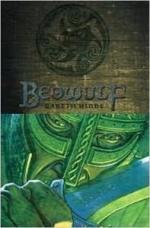Since that one through death-pain the deeds hath experienced.
He heart-grieved beholds in the house of his son the
Wine-building wasted, the wind-lodging places
Reaved of their roaring; the riders are sleeping,
65 The knights in the grave; there’s no sound of the harp-wood,
Joy in the yards, as of yore were familiar.
[1] ‘Gomelum ceorle’ (2445).—H. takes these words as referring to Hrethel; but the translator here departs from his editor by understanding the poet to refer to a hypothetical old man, introduced as an illustration of a father’s sorrow.
Hrethrel had certainly never
seen a son of his ride on the gallows to
feed the crows.
The passage beginning ‘swa bieth geomorlic’ seems to be an effort to reach a full simile, ‘as ... so.’ ’As it is mournful for an old man, etc. ... so the defence of the Weders (2463) bore heart-sorrow, etc.’ The verses 2451 to 2463-1/2 would be parenthetical, the poet’s feelings being so strong as to interrupt the simile. The punctuation of the fourth edition would be better—a comma after ‘galgan’ (2447). The translation may be indicated as follows: (Just) as it is sad for an old man to see his son ride young on the gallows when he himself is uttering mournful measures, a sorrowful song, while his son hangs for a comfort to the raven, and he, old and infirm, cannot render him any kelp—(he is constantly reminded, etc., 2451-2463)—so the defence of the Weders, etc.
XXXV.
REMINISCENCES (continued).—BEOWULF’S LAST BATTLE.
“He
seeks then his chamber, singeth a woe-song
One
for the other; all too extensive
Seemed
homesteads and plains. So the helm of the Weders
{Hrethel grieves for Herebald.}
Mindful
of Herebald heart-sorrow carried,
5
Stirred with emotion, nowise was able
To
wreak his ruin on the ruthless destroyer:
He
was unable to follow the warrior with hatred,
With
deeds that were direful, though dear he not held him.
[84] Then pressed by the pang this pain occasioned
him,
10 He gave
up glee, God-light elected;
He
left to his sons, as the man that is rich does,
His
land and fortress, when from life he departed.
{Strife between Swedes and Geats.}
Then
was crime and hostility ’twixt Swedes and Geatmen,
O’er
wide-stretching water warring was mutual,
15 Burdensome
hatred, when Hrethel had perished,
And
Ongentheow’s offspring were active and valiant,
Wished
not to hold to peace oversea, but
Round
Hreosna-beorh often accomplished
Cruelest
massacre. This my kinsman avenged,
20 The feud
and fury, as ’tis found on inquiry,
Though
one of them paid it with forfeit of life-joys,




